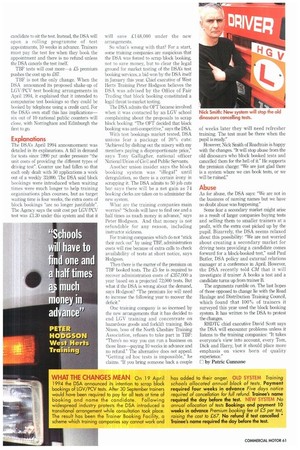BLOCKS AWAY
Page 62

Page 63

If you've noticed an error in this article please click here to report it so we can fix it.
Next month the Driving Standards Agency scraps block booking of LGV driving tests and replaces it with a system which training schools say is damaging and expensive. For its part the DM accuses trainers of abusing the old system. Where does this leave the future of driver training?
After more than a year of industry consultation, much of it conducted at
• heated level, the Driving Standards Agency introduces new arrangements next month for booking LGV/PCV driving tests.
On the face of it, whatever the arguments for or against change, test booking is not the kind of subject matter guaranteed to set the pulse racing. But if LGV training companies are right in their assertion that the new system is unworkable the situation could soon heat up when the new arrangements are introduced on 15 June.
The new regulations lay to rest the ghost of the old block booking system, which although it officially ended last October, continues in a diluted form under a transitional arrangement until 15 June. Under block booking, training companies were able to book a group of tests in advance without providing a candidate's name until the day before the test, although payment was required four weeks in advance. Each year the DSA allocated schools using this system a block of tests—if at year-end the school had failed to take up its allocation that number could be cut to meet the training company's needs at that time.
The arrangement was popular within the LGV training industry more than 70% of tests were block booked.
The system had operated for 25 years and, say the training companies, worked well, allowing the flexibility to have a test date available when a candidate was ready. There was a cancellation period of five working days, which in reality was seven, because the trainer could not include the day of cancellation or the test day in the notice period.
After 15 June schools still have an option to block book, but under circumstances that, says the USA, will cut out abuse prevalent under the old system, including "hogging" tests.
The new option, Trainer Booking Facility, will eliminate the situation where a test paid for four weeks in advance can be cancelled at five days notice, leaving the DSA with the obligation to refund the trainer and no candidate to sit the test. Instead, the DSA will open a rolling programme of test appointments, 10 weeks in advance. Trainers must pay the test fee when they book the appointment and there is no refund unless the DSA cancels the test itself.
TBF tests will cost more—a £5 premium pushes the cost up to £67.
TBF is not the only change. When the DSA announced its proposed shake-up of LGV/PCV test booking arrangements in April 1994, it explained that it intended to computerise test bookings so they could be booked by telephone using a credit card. For the DSAS own staff this has implications— six out of 10 national public counters will close, with Nottingham and Edinburgh the first to go.
Explanations
The DSA's April 1994 announcement was detailed in its explanations. A fall in demand for tests since 1990 put under pressure "the unit costs of providing the different types of driving test". Counter use had fallen so that each only dealt with 50 applications a week out of a weekly 33,000. The USA said block bookings were introduced when waiting times were much longer to help training organisations plan courses, but as target waiting time is four weeks, the extra costs of block bookings "are no longer justifiable". The Agency says the unit cost per LGV/PCV test was £1.30 under this system and that it will save £148,000 under the new arrangements.
So what's wrong with that? For a start, some training companies are suspicious that the DSA was forced to scrap block booking, not to save money, but to clear the legal ground for market testing of the DS/Vs test booking services, a bid won by the DSA itself in January this year. Chief executive of West Herts Training Peter Hodgson believes the DSA was advised by the Office of Fair Trading that block booking constituted a legal threat to market testing.
The DSA admits the OFT became involved when it was contacted by an LGV school complaining about the proposals to scrap block hooking. "The OFT decided that block booking was anti-competitive," says the USA.
With test bookings market tested, DSA unions fear a package of 20% cuts: "Achieved by dishing out the misery with my members paying a disproportionate price," says Tony Gallagher, national officer National Union of Civil and Public Servants.
Another union insider says the block booking system was "illegal" until deregulation, so there is a certain irony in scrapping it. The DSA admits to 50 job cuts but says there will be a net gain as 74 booking clerks are taken on to administer the new system.
What are the training companies main worries? "Schools will have to find one and a half times as much money in advance," says Peter Hodgson. And that money is not refundable for any reason, including instructor sickness.
For training companies which do not "stick their neck out" by using TBF, administration costs will rise because of extra calls to check availability of tests at short notice, says Hodgson.
Then there is the matter of the premium on TBF booked tests. The £5 fee is required to recover administration costs of £357,000 a year based on a projected 72,000 tests. But what if the USA is wrong about the demand, says Hodgson? "The premium fee will need to increase the following year to recover the deficit."
One training company is so incensed by the new arrangements that it has decided to end LGV training and concentrate on hazardous goods and forklift training. Bob Nixon, boss of the North Cheshire Training Association, refuses to take part in TBF: "There's no way you can run a business on those lines—paying 10 weeks in advance and no refund." The alternative does not appeal. "Getting ad hoc tests is impossible," he claims. "If you bring someone back a couple of weeks later they will need refresher training. The test must be there when the pupil is ready" However, Nick Smith of Roadtrain is happy with the changes. "It will stop abuse from the old dinosaurs who block booked tests and cancelled them for the hell of it." He supports the premium charge: "We are just glad there is a system where we can book tests, or we will be ruined."
Abuse
As for abuse, the DSA says: "We are not in the business of naming names but we have no doubt abuse was happening."
Some fear a secondary market might arise as a result of larger companies buying tests and selling them to smaller trainers at a profit, with the extra cost picked up by the pupil. Bizarrely, the DSA seems relaxed about this possibility: "We are not worried about creating a secondary market for driving tests providing a candidate comes forward for a block-booked test," said Paul Butler, DSA policy and external relations manager at a conference in April. However, the USA recently told CM that it will investigate if trainer A books a test and a candidate turns up from trainer B.
The arguments rumble on. The last hopes of those opposed to change lie with the Road Haulage and Distribution Training Council, which found that 100% of trainers it surveyed this year used the block booking system. It has written to the USA to protest the changes.
RIIDTC chief executive David Scott says the DSA will encounter problems unless it listens to the training companies: "It takes everyone's view into account, every Tom, Dick and Harry, but it should place more emphasis on views born of quality experience."
ri by Patric Cunnane




















































































































































